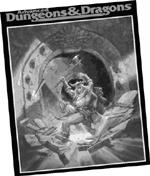THE ANNOUNCEMENT BY Renton-based Wizards of the Coast last month that they were contemplating transforming the core rules of their best-selling Dungeons & Dragons game into an open-source product went largely unnoticed by mainstream media, mostly because both D&D and the open-source movement are cultures dominated by hardcore geeks. (Here’s a quick test: if you know what a +3 enchanted broadsword does when swung by a Level 4 Paladin at a Red Dragon, and if you actually care, you’re in.) But in a society that increasingly takes its marching orders—be they financial, social, or cultural—from the geek brigade, this was news indeed.
For many of the visionaries of the high-tech industry, along with its daily foot soldiers, D&D was an inevitable rite of passage. Some of the earliest computer games, such as Rogue and Hack, along with some of the first uses of the Internet, including MUDs (Multiple User Dungeons, the granddaddies of chatrooms), were directly inspired by the paper-and-pencil game developed by Gary Gygax in the early ’70s. Computer game top sellers, including Diablo, Myst, and Everquest, contain large dollops of the Tolkienesque puree made popular by D&D. And the open-source movement, with its anticorporate message about the superiority of thousands of independent code writers over the best that Microsoft has to offer, is the Abraham Lincoln Brigade of the current war for the soul of the cyberworld.
Still, the announcement is a hugely ironic statement. Before their purchase by WOTC in 1997, D&D’s home company, TSR, was notoriously technophobic. When their Lake Geneva, Wisconsin, employees migrated to Renton, horror stories circulated about how TSR’s refusal to use computers in its daily operations was directly responsible for the company’s financial ruin. TSR was also infamous for zealous legal attacks on any “unofficial” rules and scenarios, either published or in play. (Often led, it must be said, by creator Gygax, despite his recent public support of the open-source concept.) Fan-produced Web sites that posted variant D&D rules and scenarios were often subjected to “cease-and-desist” notices from TSR lawyers.
SO WHY THE ABOUT-FACE? And what does it mean, anyway, to have the “core rules” of D&D placed on the Web, available for tinkering and modification by any gamer who happens to download the pages?
According to longtime gamer and open-source advocate Tim, the idea of having D&D rendered open source does make a sort of sense, even though the information provided is not electronic code but rules for a pencil-and-paper game. “Open source is not just about electronic forms. As long as people take info, modify it, and then plan to pass it along to someone else for a potential profit, whoever has that information in the first place is right to consider whether or not they want a part of that profit. It doesn’t necessarily have to be about computers to be a valuable idea. People I know talk about ‘open source’ regarding conversations they’re having on a whole variety of subjects.”
That’s not to say that WOTC’s actions are primarily philanthropic and not promotional. Seasoned gamers know that while it still remains a top-selling game, D&D is also one of the clunkiest role-playing systems on the market. With its emphasis on combat and gold pieces, along with its fetishistic fascination with extensive charts and tables, it’s seen as markedly inferior both to more sophisticated pencil-and-paper role-playing games (such as Steve Jackson’s GURPS, with its streamlined play and dizzying number of fantasy and science-fiction milieus), as well as to online gaming—from hack-and-slay favorites like Doom and Diablo to the more fully rounded role-playing of Everquest and Asheron’s Call.
Perhaps the oddest aspect of WOTC’s statement is that it fundamentally ignores the fact that
despite clear areas of overlap between D&D players and computer geeks, D&D is fundamentally a face-to-face human interaction. A bunch of guys (with the occasional esteemed gal) sit around in a room filled with Chee-tos and Mountain Dews, a couple of rule books shared out between them, and tell stories about how their imaginary characters conquer imaginary foes and win imaginary treasures. For all but the most anally retentive gamer, rules to such an evening are infinitely malleable and are either set by mutual consent of the gaming group or altered on a spur-of-the-moment whim.
Since the rules to Poker are published online, is that game also open source? How about baby showers? Or weddings? There are plenty of “rule books” available for all kinds of games and rituals, but also a commonsense understanding that these are merely guidelines.
And here we come to the crux of the matter. As much as WOTC would like to pretend that they have the power, one way or the other, to open source their game, D&D players have been treating the game as an open-source product all along. They’ve been altering rules, swapping ideas, and running homemade scenarios since its beginnings almost 30 years ago. “I would say that if TSR is doing this, then what they’re saying is that they finally realize that gamers have been doing this for generations,” says Tim. “What they’re saying is that there’s a following that’s larger than what any commercial store could hold.”
It’s a pleasant gesture, perhaps meaningful in introducing the open-source philosophy to upcoming generations of gamers, but at best it merely gives the official stamp to a long-standing practice.









